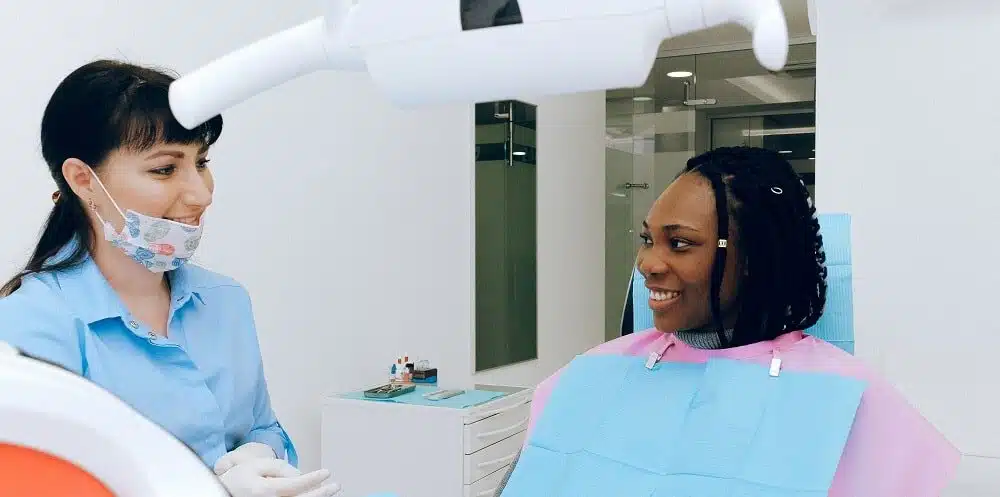Gingivitis and periodontitis are gum diseases that infect the gums and bones that surround and support your teeth. Without treatment, gum disease results in loose teeth and eventually the loss of teeth. When gum disease is present, a routine cleaning isn’t enough to restore your dental health. Instead, you’ll need a dental deep cleaning. Learn everything you need to know about deep cleanings, below.
Trident General Dentistry offers superior dental care in Charleston, SC. Book an appointment with us today!
Early Signs of Gum Disease
Without proper dental care, gum disease can quickly occur. Here are some of the early signs of gum disease:
· Your gums bleed after brushing or flossing.
· The color of your gums changes from pink to red.
· Your gums hurt and become swollen.
· You have bad breath every day or a bad taste in your mouth.
· You notice a loose tooth or teeth.
· You experience a change in the way your teeth fit together when biting.
· Your dentist or dental hygienist tells you that you have pockets between your teeth and gums.
Once you have gum disease, one of the first treatments recommended is a deep cleaning.
Differences Between A Deep Cleaning And A Regular Cleaning
You might ask why you can’t have a regular dental cleaning to help restore your gums to health. The reason is that a regular cleaning doesn’t treat gum disease once it progresses past mild gum inflammation.
A deep cleaning differs from a regular cleaning in these ways:
Routine Dental Cleanings
-
Remove plaque and bacteria from healthy gums
-
Effectively clean your gums if no gum pockets are present
-
Take a single and relatively short appointment
-
Rarely requires numbing with a dental anesthetic
Deep Dental Cleanings
-
Remove plaque and bacteria from severely inflamed or infected gums
-
Clean periodontal pockets that form between your teeth and gums
-
Usually take more than one visit
-
Requires numbing of your gums for adequate cleaning
What Can I Expect During A Deep Cleaning?
Gum disease can exist with no pain, while gums lose their attachment to teeth and bone. This creates a pocket or space alongside the tooth that traps plaque, dental tartar, and bacteria. Without the removal of these, the pocket gets deeper and destroys the bony support of the tooth.
A deep cleaning cleans the entire depth of this pocket. Another word for this procedure is “deep scaling.” Specialized dental instruments such as scalers and ultrasonics can clean the entire pocket. The next part of a deep cleaning is “root planing,” which smooths the exposed root surfaces to help prevent recurrence of plaque buildup.
Is A Deep Cleaning Painful?
Typically, your dentist numbs your teeth and gums with a local dental anesthetic for a deep cleaning. You might feel some pressure but no pain during the cleaning.
How Long Does It Take For Gums To Heal After Deep Cleaning?
You may have sensitive teeth after a deep cleaning. This is normal unless it becomes severe or continues for more than a couple of weeks. Occasionally, you may need treatment to resolve the sensitivity. Usually, your gums heal within one week of deep cleaning.
How Often Should Teeth Be Deep Cleaned?
To maintain healthy and disease-free gums, a deep cleaning may be necessary every three months. These cleaning appointments are essential to keep because periodontal disease can return quickly and cause further damage to the gums and supporting bone. It’s possible that with excellent home care, you will need less frequent deep cleanings.
Oral Care After A Deep Cleaning
After a deep cleaning, your teeth and gums are clean and free of plaque. It’s important to keep your follow-up appointments and keep your teeth clean at home. You’ll receive special instructions on the necessary oral hygiene habits to prevent the recurrence of gum disease. These instructions will include brushing your teeth at least twice each day, flossing at least once each day, and possibly using a prescription or over-the-counter mouth rinse.
Schedule an Appointment with Trident General Dentistry
Preventing gum disease is critical to your oral and general health. The consequences of gum disease include losing teeth, bad breath, and possibly a role in serious health issues. To learn more about how you can prevent gum disease, contact Trident General Dentistry.

